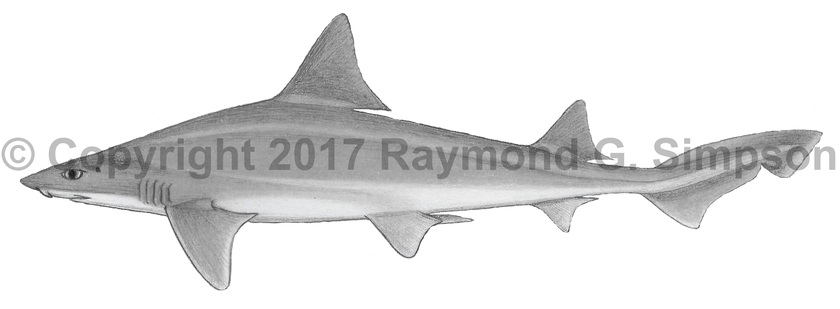
Common Name
Smalltooth Smoothhound
Year Described
Heemstra, 1997
Identification
A small and slender shark with two large dorsal fins. Mouth with upper labial furrows slightly longer than lower furrows. Teeth small and low with no detached cusps and numerous low ridges. Upper jaw: 60-67 rows. Lower jaw: 60-61 rows. Eye larger than inter-nostril distance with a prominent spiracle less than eye diameter behind it. Nostril with projecting tabs. Distance between nostrils 2.7-3.1% TL. Dorsal fins lack spines. Second dorsal fin about 75% as high as the first. First dorsal fin quite high; origin over rear base of pectoral fin. Second dorsal fin origin anterior to anal fin origin but well behind pelvic free tip. Pectoral fin angular. Pelvic and anal fins much smaller than second dorsal fin. No precaudal pits. Caudal fin with a poorly developed lower lobe. Skin with overlapping single-pointed denticles with 4 weak ridges. Sometimes has weakly tri-pointed denticles.
Color
Body uniformly gray above, grading to white on the belly.
Size
Maximum size to at least 57cm TL. Mature adults at 47cm TL.
Habitat
Captured in fairly deep water (71-183m) compared to related species.
Range
Southern Caribbean Sea: Colombia to Venezuela
References
Compagno, L., M. Dando, and S. Fowler. 2005. Sharks of the World. Princeton University Press, 480 pp.
Heemstra, P.C. 1997. A review of the smooth-hound sharks (genus Mustelus, family Triakidae) of the western Atlantic Ocean, with descriptions of two new species and a new subspecies. Bulletin of Marine Science, 60(3), 894-928.
Rosa, M.R., & O.B.F. Gadig. 2010. Taxonomic comments and an identification key to species for the Smooth-hound sharks genus (Mustelus Link, 1790) (Chondrichthyes: Triakidae) from the Western South Atlantic. Pan-American Journal of Aquatic Sciences, 401-413.